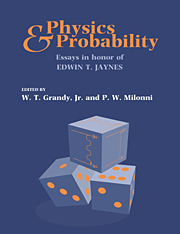Book contents
- Frontmatter
- Contents
- Preface
- Recollections of an Independent Thinker
- A Look Back: Early Applications of Maximum Entropy Estimation to Quantum Statistical Mechanics
- The Jaynes–Cummings Revival
- The Jaynes–Cummings Model and the One-Atom-Maser
- The Jaynes–Cummings Model is Alive and Well
- Self-Consistent Radiation Reaction in Quantum Optics – Jaynes' Influence and a New Example in Cavity QED
- Enhancing the Index of Refraction in a Nonabsorbing Medium: Phaseonium Versus a Mixture of Two-Level Atoms
- Ed Jaynes' Steak Dinner Problem II
- Source Theory of Vacuum Field Effects
- The Natural Line Shape
- An Operational Approach to Schrödinger's Cat
- The Classical Limit of an Atom
- Mutual Radiation Reaction in Spontaneous Emission
- A Model of Neutron Star Dynamics
- The Kinematic Origin of Complex Wave Functions
- On Radar Target Identification
- On the Difference in Means
- Bayesian Analysis, Model Selection and Prediction
- Bayesian Numerical Analysis
- Quantum Statistical Inference
- Application of the Maximum Entropy Principle to Nonlinear Systems Far from Equilibrium
- Nonequilibrium Statistical Mechanics
- A Backward Look to the Future
- Appendix: Vita and Bibliography of Edwin T. Jaynes
- Index
Appendix: Vita and Bibliography of Edwin T. Jaynes
Published online by Cambridge University Press: 21 October 2009
- Frontmatter
- Contents
- Preface
- Recollections of an Independent Thinker
- A Look Back: Early Applications of Maximum Entropy Estimation to Quantum Statistical Mechanics
- The Jaynes–Cummings Revival
- The Jaynes–Cummings Model and the One-Atom-Maser
- The Jaynes–Cummings Model is Alive and Well
- Self-Consistent Radiation Reaction in Quantum Optics – Jaynes' Influence and a New Example in Cavity QED
- Enhancing the Index of Refraction in a Nonabsorbing Medium: Phaseonium Versus a Mixture of Two-Level Atoms
- Ed Jaynes' Steak Dinner Problem II
- Source Theory of Vacuum Field Effects
- The Natural Line Shape
- An Operational Approach to Schrödinger's Cat
- The Classical Limit of an Atom
- Mutual Radiation Reaction in Spontaneous Emission
- A Model of Neutron Star Dynamics
- The Kinematic Origin of Complex Wave Functions
- On Radar Target Identification
- On the Difference in Means
- Bayesian Analysis, Model Selection and Prediction
- Bayesian Numerical Analysis
- Quantum Statistical Inference
- Application of the Maximum Entropy Principle to Nonlinear Systems Far from Equilibrium
- Nonequilibrium Statistical Mechanics
- A Backward Look to the Future
- Appendix: Vita and Bibliography of Edwin T. Jaynes
- Index
Summary
Ed Jaynes was born in Waterloo, Iowa, on 5 July 1922, the son of a surgeon. He attended Cornell College and the University of Iowa, receiving the B.A. degree in physics from the latter in 1942, and was then engaged in Doppler radar development at the Sperry Gyroscope Company in New York in 1942–43. He was subsequently appointed an Ensign in the U.S. Navy, and worked at the Naval Research Laboratory at Anacostia on microwave IFF equipment.
Lt(jg) Jaynes was discharged from the Navy in 1946 and spent that summer at Stanford working with W.W. Hansen on the design of the first linear electron accelerator. In the 1946–47 school year he was a graduate student at Berkeley, a student of J.R. Oppenheimer. When Oppenheimer left to take over the Institute for Advanced Study in Princeton in the summer of 1947, Jaynes also transferred to Princeton University. He received his Ph.D. in physics there in 1950, with a thesis in solid-state theory supervised by Eugene Wigner.
He then returned to Stanford, where he was Instructor, Assistant Professor, and Associate Professor during 1950–60. At this time he also consulted for Varian Associates on problems of magnetic resonance instrumentation. In 1960 he was appointed Professor of Physics at Washington University in St. Louis, and in 1975 became Wayman Crow professor of Physics.
- Type
- Chapter
- Information
- Physics and ProbabilityEssays in Honor of Edwin T. Jaynes, pp. 277 - 282Publisher: Cambridge University PressPrint publication year: 1993

